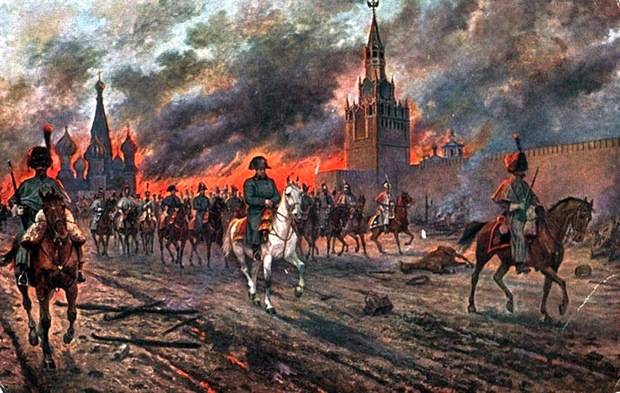How to prevent the explosion of the Kremlin

In October, 1812, Napoleon ordered the Kremlin to be blown up, but a number of circumstances prevented the destruction of the heart of Russia
Moscow became the last capital of Europe, which was occupied by Napoleon Bonaparte's troops. Rome and Cairo, Lisbon and Madrid, Berlin and Vienna, Amsterdam and Warsaw — the Corsican army was a winner in these cities.
Moscow turned out to be the only city in which there were practically no inhabitants. There were no delegations, there were no curious onlookers, no one Muscovites came to listen to the French march "La victoire est a nous!" ("Victory is ours!").
The only correct way that the Russians considered meeting the European invaders was fire. After placing the Gauls and twenty nations in Moscow, the Russians set the city on fire from all sides. First of all, barns and food stores, warehouses with fodder, arsenals with ammunition, everything that they did not have time to evacuate, were set on fire. The fire was supposed to destroy everything that the opponents could take advantage of and, thereby, drive them into difficult conditions.
Napoleon, watching the glow of the Moscow fire, could only exclaim: “What a terrible sight! That they themselves harness ... What kind of people! These are Scythians. ”
ex.direct
OVS developers
Cyril Bragin / 23 October 2017, 19: 00
Russian victories, History
5371
How to prevent the explosion of the Kremlin
How to prevent the explosion of the Kremlin
In October, 1812, Napoleon ordered the Kremlin to be blown up, but a number of circumstances prevented the destruction of the heart of Russia
Moscow became the last capital of Europe, which was occupied by Napoleon Bonaparte's troops. Rome and Cairo, Lisbon and Madrid, Berlin and Vienna, Amsterdam and Warsaw — the Corsican army was a winner in these cities.
Moscow turned out to be the only city in which there were practically no inhabitants. There were no delegations, there were no curious onlookers, no one Muscovites came to listen to the French march "La victoire est a nous!" ("Victory is ours!").
The only correct way that the Russians considered meeting the European invaders was fire. After placing the Gauls and twenty nations in Moscow, the Russians set the city on fire from all sides. First of all, barns and food stores, warehouses with fodder, arsenals with ammunition, everything that they did not have time to evacuate, were set on fire. The fire was supposed to destroy everything that the opponents could take advantage of and, thereby, drive them into difficult conditions.
Napoleon, watching the glow of the Moscow fire, could only exclaim: “What a terrible sight! That they themselves harness ... What kind of people! These are Scythians. ”
Meanwhile, the barbarians behaved precisely "civilized" Europeans. Although Napoleon forbade his soldiers to rob the city, the French did not intend to execute this order, only the Kremlin attempted to preserve order, and the memoirs of the participants in the march to Russia are replete with records of "entertainment" in Moscow.
Meanwhile, Napoleon began to realize that taking the heart of Russia was the beginning of his end. This is true noticed Byron.
Here are the towers of Moscow's semi-wild
Before you in the crowns of gold
Burning in the sun ... But, alas!
That sun of your sunset!
In Moscow, Napoleon organized local self-government, tried to organize cultural leisure for his army, one day was going to reward the “heroes” of the Russian campaign, but after receiving the news of the defeat of the avant-garde of the Great Army in the battle on Chernichka, he decided to leave Moscow.
In retaliation to Alexander I, who did not enter into peace negotiations with the conqueror, he ordered Napoleon to blow up the Kremlin. The execution of this case was assigned to the Governor-General of Moscow, Marshal Mortier.
Mortier ordered his soldiers to seize Muscovites and mine the cathedrals and palaces of the Kremlin, the Ivan the Great Bell Tower and other buildings.
“Moscow, October 21 ... The Kremlin towers are filled with gunpowder. The explosion was supposed to happen tonight at 10 at night, as I informed you in the morning letter. I will postpone this operation until 12 hours of night 23 th ... ", - said Mortier in a report to the Chief of General Staff.
The Arsenal building, part of the Kremlin wall, were blown up, and the Nikolskaya Tower was partially destroyed. Fully implement the conceived Mortier failed. In places the smoldering wicks put out the rain, some put out the alert Muscovites and the Cossack patrols who came to the rescue. The Kremlin was saved.
A huge wagon train, the French leaving Moscow, stretched for several miles. As the participant of the campaign, Larrey, "the army of Darius during the exit from Babylon, no doubt, was not carrying so much wealth and luggage." However, soon all the loot will be lost on the way, and the Great Army will cease to exist.
Information